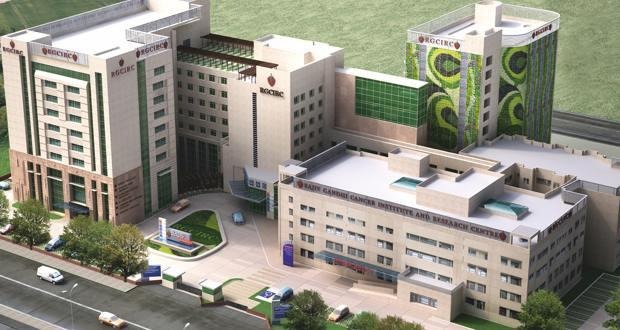RGCI-RC – At the cutting edge

There are many firsts for the Rajiv Gandhi Cancer Institute and Research Centre (RGCI-RC). It was the first hospital in India to establish a molecular laboratory, the first to introduce robotic surgery for cancer patients and the first to install true beam for precision radiotherapy. The 300-bed RGCI-RC that sits on a 2 lakh sq. ft campus is one of Asia’s largest tertiary cancer care centres. Established in 1996 by Indraprastha Cancer Society and Research Centre, it is a “not for profit organisation” with the primary objective of offering the best cancer care to the patients. The society was founded by a group of 10 philanthropists.
“Comprehensive cancer care is a concept which was envisaged right from the beginning and has been a boon to the patients since all facilities exist under one roof. We can also rightly claim that the spectrum of services offered at Rajiv Gandhi Cancer Institute & Research Centre could compare to any in the world,” says D S Negi, CEO, RGCI-RC. Along with comprehensive patient care, RGCI-RC has been undertaking research on the cancer causes, diagnosis, treatment modalities and prevention. It is recognised as a Scientific & Industrial Research Organisation (SIRO) by the Centre’s Department of Science & Technology. The institute promotes basic and translational cancer research and collaborates with national and international cancer research institutes.
The research is focused on a better understanding of the cancer biology to discover newer methods for cancer prediction, prevention, diagnosis and treatment. It also aims to find ways to improve the quality of life for cancer patients. The research ranges from investigating genetic changes in samples of the patient tumour to creating new imaging techniques to finding the most efficient ways of radiation therapy administration.
“WE FOSTER AN ENVIRONMENT OF HOLISTIC THINKING, IN WHICH HUMAN TOUCH IS NOT RELEGATED TO THE BACK BURNER, RATHER IT CAN BE FOUND IN EVERY LITTLE ASPECT OF OUR PATIENT CARE ACTIVITIES.”
D S Negi, CEO, RGCI-RC
The institute boasts of a world-class biorepository (tissue bank) which caters to the cancer research community. A biorepository is a repository of biospecimens which are available to scientists for basic and clinical research. RGCI-RC offers these biospecimens to its researchers and also to those from Delhi Technical University, University of Delhi, Jamia Millia Islamia University, Indian Institute of Technological Research, IIT-Roorkee, etc. to advance cancer research. The specimens are also shared with several international Institutes like Cureline and Reprocell. RGCI-RC has a hospital-based cancer registry which records the information of its cancer patients. This helps in improving patient care and the outcome. The registry also contributes to the population-based cancer registry of the area and helps with epidemiological research. Its data is used in clinical research such as survival rate of different patient groups, the efficacy of various treatment methods, etc.
The institute has been developing the Atlas of Cancer in Punjab State since 2012. This venture of the institute will go a long way in providing useful data for the clinicians and the scientists engaged in research on cancer and will help unravel the enigma of cancer cells, says Negi. RGCI-RC associates with the Institute of Cytology and Preventive Oncology (ICPO), Noida on several collaborative research projects on different types of cancer. Around 40 basic research projects have been undertaken by the institute. A number of them have been completed and published in peer-reviewed scientific journals. Clinical research has been on for 15 years now, and RGCI-RC has taken part in over 100 international multi-center clinical trials in different phases. We foster an environment of holistic thinking, in which human touch is not relegated to the back burner, rather it can be found in every little aspect of our patient care activities,” says Negi.
Fact File
Rajiv Gandhi Cancer Institute
and Research Centre
Location: New Delhi
Founded in: 1996
CEO: D S Negi
















